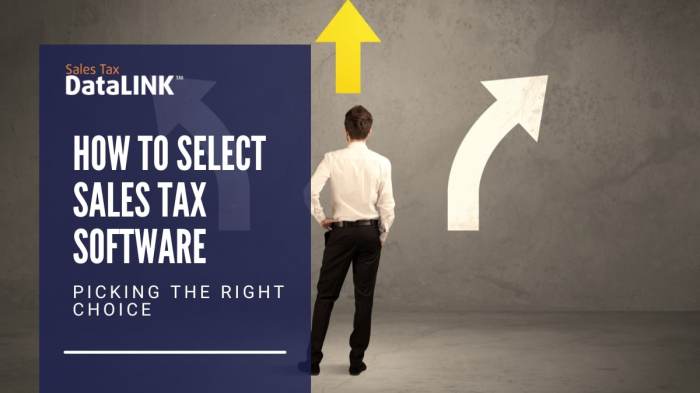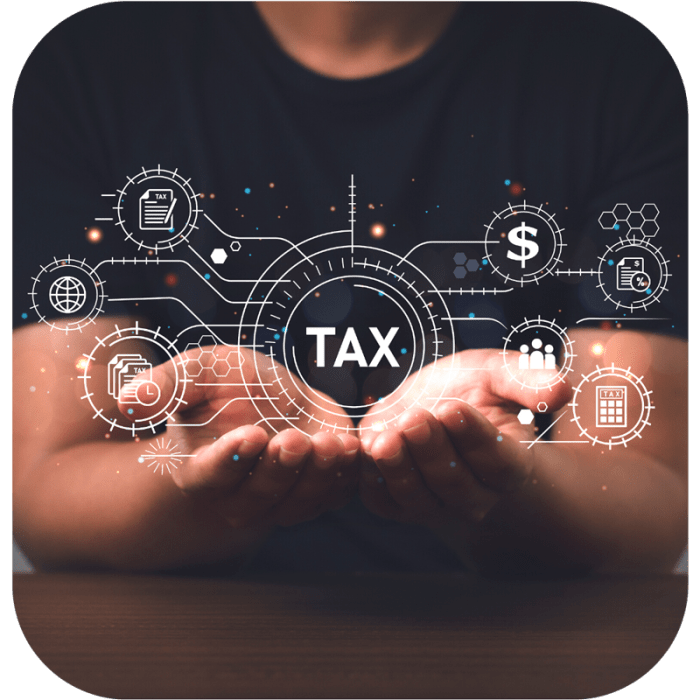Sales use tax software is revolutionizing how businesses manage their tax obligations. Navigating the complexities of sales and use tax can be daunting, involving intricate state and local regulations, varying thresholds, and frequent updates. Effective sales use tax software provides a streamlined solution, automating many processes and significantly reducing the risk of costly errors. This allows businesses to focus on growth rather than getting bogged down in compliance details.
These software solutions offer a range of features designed to simplify tax calculations, reporting, and remittance. Many integrate directly with accounting systems, eliminating the need for manual data entry and minimizing the potential for human error. Advanced features often include automated tax rate updates, nexus determination tools, and robust audit trail capabilities, providing a comprehensive approach to tax management.

Source: salestaxdatalink.com
Navigating the complex world of sales and use tax can be a daunting task for businesses of all sizes. From understanding the varying state and local regulations to accurately calculating and remitting taxes, the process is often time-consuming and prone to errors. This is where sales use tax software steps in, offering a powerful solution to simplify compliance and mitigate potential risks.
This detailed guide explores the key features, benefits, and considerations involved in choosing and implementing the right sales use tax software for your business.
Understanding Sales and Use Tax
Before delving into the specifics of sales use tax software, it’s crucial to understand the fundamental principles of sales and use tax. Sales tax is levied on the sale of tangible personal property and certain services within a specific jurisdiction. Use tax, on the other hand, is levied on the use, consumption, or storage of tangible personal property purchased from out-of-state vendors where sales tax wasn’t collected at the point of sale.
The complexities arise from the varying rates and rules across different states, counties, and even cities.
Key Aspects of Sales and Use Tax Compliance
- Taxability Determination: Identifying which products and services are subject to sales tax in each jurisdiction.
- Rate Calculation: Accurately determining the applicable tax rate based on location and product type.
- Exemptions and Deductions: Understanding and applying various exemptions and deductions allowed by law.
- Nexus: Establishing a “physical presence” (nexus) in a state, triggering the obligation to collect sales tax in that state.
- Reporting and Remittance: Timely filing of tax returns and remitting the collected taxes to the appropriate authorities.
The Role of Sales Use Tax Software
Sales use tax software automates many of the complex tasks associated with sales and use tax compliance, significantly reducing the burden on businesses. These solutions offer a range of features designed to streamline the entire process, from tax calculation to reporting and remittance.
Core Features of Effective Sales Use Tax Software
- Automated Tax Calculation: Software automatically calculates the correct sales tax based on the product, location, and applicable tax rates. This eliminates manual calculations and reduces the risk of errors.
- Tax Rate Management: Keeps track of constantly changing tax rates and regulations across various jurisdictions, ensuring compliance with the latest laws.
- Nexus Management: Helps businesses determine their nexus in different states and manage their sales tax obligations accordingly.
- Exemption Management: Allows businesses to easily manage and track tax exemptions for specific customers or products.
- Reporting and Filing: Generates accurate and timely sales tax returns for various jurisdictions, simplifying the filing process.
- Audit Trail: Provides a complete audit trail of all tax transactions, facilitating internal audits and assisting with tax audits by authorities.
- Integration with Accounting Software: Seamless integration with existing accounting systems for efficient data transfer and reconciliation.
- Real-time Tax Updates: Software automatically updates tax rates and regulations, ensuring continuous compliance.
Choosing the Right Sales Use Tax Software
Selecting the appropriate sales use tax software depends on several factors, including the size and complexity of your business, your sales volume, the number of jurisdictions you operate in, and your budget. Consider these key factors:
Factors to Consider When Selecting Sales Use Tax Software
- Scalability: Ensure the software can adapt to your business’s growth and changing needs.
- Ease of Use: Choose software with a user-friendly interface that is easy to navigate and understand.
- Integration Capabilities: Check for compatibility with your existing accounting and e-commerce platforms.
- Customer Support: Reliable customer support is essential to address any issues or questions that may arise.
- Pricing and Features: Compare pricing models and features offered by different providers to find the best value for your money.
- Security: Ensure the software provider employs robust security measures to protect your sensitive data.
- Compliance: Verify that the software complies with all relevant tax laws and regulations.
Benefits of Using Sales Use Tax Software
Implementing sales use tax software offers numerous advantages for businesses:

Source: taxcloud.com
- Reduced Errors: Automation minimizes manual errors in tax calculations and reporting.
- Improved Accuracy: Ensures accurate tax calculations and compliance with tax laws.
- Time Savings: Automates time-consuming tasks, freeing up valuable time for other business activities.
- Cost Savings: Reduces the risk of penalties and interest associated with non-compliance.
- Enhanced Compliance: Helps businesses stay compliant with constantly evolving tax regulations.
- Better Data Management: Provides a centralized system for managing all sales tax data.
- Improved Cash Flow: Accurate tax calculations and timely remittances ensure efficient cash flow management.
Frequently Asked Questions (FAQ): Sales Use Tax Software
- Q: Is sales use tax software necessary for small businesses? A: While not mandatory for all small businesses, it can significantly simplify tax compliance and reduce the risk of errors, especially as your business grows and operates in multiple states.
- Q: How much does sales use tax software cost? A: Pricing varies widely depending on the features, scalability, and provider. Some offer subscription-based models while others charge a one-time fee.
- Q: Can sales use tax software integrate with my existing accounting software? A: Many sales use tax software solutions offer seamless integration with popular accounting platforms like QuickBooks and Xero.
- Q: What if tax laws change? A: Reputable sales use tax software providers automatically update their systems to reflect changes in tax laws and regulations, ensuring ongoing compliance.
- Q: How do I choose the best software for my business? A: Consider your business size, sales volume, number of jurisdictions, budget, and desired features. Research different providers and compare their offerings before making a decision.
Conclusion
Sales use tax software is an invaluable tool for businesses seeking to streamline their tax compliance processes. By automating tax calculations, managing nexus, and simplifying reporting, this software significantly reduces the burden of sales and use tax compliance, minimizing errors, saving time, and mitigating potential risks. Choosing the right software requires careful consideration of your business needs and available options.
Investing in a robust solution can lead to improved efficiency, enhanced accuracy, and greater peace of mind.
Resources
- Internal Revenue Service (IRS)
- Tax Policy Center
- [Add links to reputable sales tax software providers]
Call to Action
Ready to simplify your sales and use tax compliance? Explore the leading sales use tax software solutions available today and find the perfect fit for your business. Start your free trial or request a demo to see how these tools can transform your tax processes.
In conclusion, the adoption of sales use tax software offers businesses a significant advantage in managing their tax obligations. By automating key processes, reducing errors, and improving compliance, these tools empower businesses to operate more efficiently and focus their resources on core business functions. The ongoing evolution of these platforms ensures that businesses remain adaptable to evolving tax landscapes and maintain a strong compliance posture.
FAQ Corner
What types of businesses benefit most from sales use tax software?
Businesses with high transaction volumes, those operating in multiple states, or those selling taxable goods and services online generally benefit the most. The complexity of managing sales tax across various jurisdictions makes software solutions particularly valuable for these entities.
How much does sales use tax software typically cost?
Pricing varies greatly depending on the features offered, the number of users, and the scale of the business. Software providers typically offer different pricing tiers to cater to businesses of all sizes. It’s advisable to contact vendors directly for accurate pricing information.
Is sales use tax software difficult to learn and use?
Most modern sales use tax software solutions are designed with user-friendliness in mind. Many providers offer training resources and support to help businesses get started. The level of complexity depends on the specific features and the user’s technical proficiency.
How does sales use tax software ensure data security?
Reputable software providers employ robust security measures to protect sensitive financial data. These measures often include encryption, secure data centers, and regular security audits. It’s crucial to choose a provider with a strong commitment to data security.